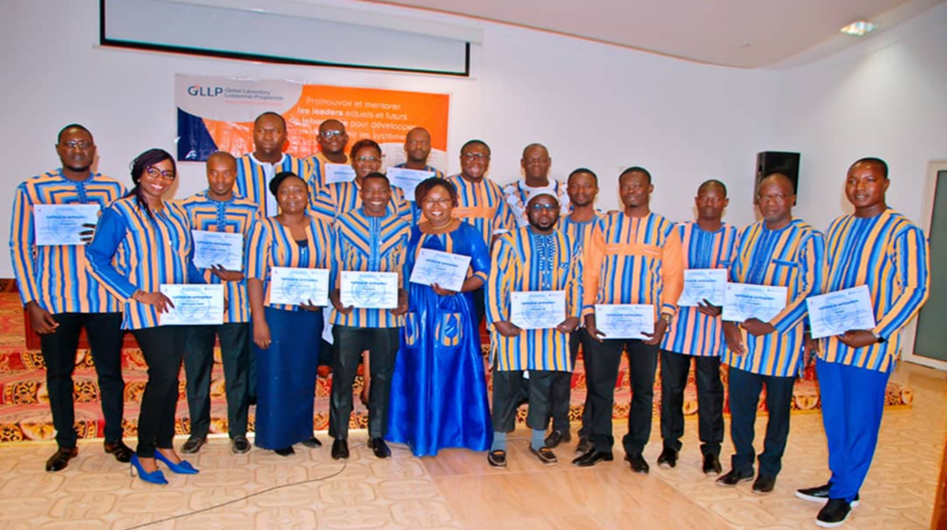At a glance
CDC works with the Ministry of Health and other partners to build effective public health collaboration and partnerships, which strengthen the country's core public health capabilities: data and surveillance, laboratory capacity, workforce and institutions, prevention and response, innovation and research, and policy, communications, and diplomacy.

Overview
CDC established an office in Burkina Faso in 2016, and began collaborating with the Ministry of Health (MOH) in 1991. CDC Burkina Faso works closely with the Government of Burkina Faso and partner organizations to detect, prevent, and control infectious disease outbreaks, and build and strengthen the country's core public health capabilities. These include data and surveillance, laboratory capacity, workforce and institutions, prevention and response, innovation and research, and policy communications and diplomacy. CDC's work aims to protect the health of our nations and public health around the world.
Global health security
Surveillance systems
CDC supports the implementation of surveillance of priority diseases in more than 14 sentinel sites across the country. CDC also supports data management, trainings, monitoring, laboratory capacity strengthening, and specimen transport.
Laboratory systems strengthening
The continued presence of high priority diseases highlights the urgent need to strengthen laboratory surveillance to detect them accurately and rapidly. CDC's support for building laboratory capacity in Burkina Faso ensures rapid detection of and response to disease.
Workforce development
CDC supports workforce development through the following training programs:
Global Laboratory Leadership Program (GLLP)

This program works to foster and mentor current and emerging leaders to build, strengthen, and sustain national laboratory systems. The program emphasizes a One Health approach. Leaders are trained to determine appropriate laboratory diagnostics and build strong collaborative networks with relevant sectors at every level of the health system. GLLP's first cohort was composed of 18 participants and nine mentors from the human, animal, food, and environmental laboratory sectors.
Field Epidemiology Training Program (FETP)
CDC established the program in 2010 with the collaboration from the African Field Epidemiology Network. FETP consists of three levels of training: frontline, intermediate, and advanced tiers. The program has generated support in surveillance data analyses, surveillance system evaluations, and studies of public health issues. FETP graduates have supported outbreak investigations and responses for measles, meningitis, polio, yellow fever, rabies, dengue, cholera, hepatitis E, and COVID-19.
Public Health Emergency Management Fellowship (PHEMF)
A three-month training program that aims to strengthen public health emergency management capacity.
Emergency response
CDC helps develop emergency management systems to train MOH staff and leadership for improved responses to disease outbreaks and other public health emergencies. In 2018, CDC supported the establishment of the Public Health Emergency Operations Center, known as the Centre des Opérations de Réponse aux Urgences Sanitaires.
National Public Health Institute (NPHI)
In 2018, Burkina Faso established an NPHI, L’Institut National de Santé Publique (INSP). With CDC's technical and financial support, the INSP has engaged in strategic planning, reinforced public health surveillance, and promoted the use of evidence to inform decisions. CDC support has also helped to build staff capacity, enhance logistics, and strengthen public health communications.
Key achievements
- CDC supports antimicrobial resistance (AMR) detection and surveillance capacities at the national AMR reference laboratory and in 22 sentinel sites throughout the country.
- Over 360 fellows have graduated from FETP since the program established in 2010.
- CDC supported the training of 9 leadership staff from the MOH in Advanced PHEMF Training. These staff serve as incident managers to manage public health emergencies in the country and contribute to basic and intermediate PHEMF trainings.
- CDC supported investigations of dengue and chikungunya outbreaks in 2023, 2021, and 2017.
- CDC collaborated with MOH's Direction Générale de la Santé Publique and INSP to establish a national public health bulletin. The PHB serves as the primary communication channel for disseminating timely, reliable, authoritative, accurate, objective, and useful information to improve the public's health.
Immunization
CDC partnered with the Bill & Melinda Gates Foundation in Burkina Faso to measure the impact of a schedule change for the pneumococcal conjugate vaccine (PCV). CDC's research, technical assistance, and policy leadership will inform future vaccine policy to help achieve higher and more equitable PCV coverage. High vaccine coverage can improve quality of life and save the lives of thousands of vulnerable children.
During the pandemic, CDC supported COVID-19 immunization through training, vaccine delivery to priority populations, data quality improvement, management and utilization, and strategic planning.
One health
Since 2017, Burkina Faso tracks five priority zoonotic diseases. This includes dengue, rabies, anthrax, brucellosis, and highly pathogenic avian influenza. CDC supported the implementation of a sentinel surveillance system for dengue and arboviruses. Since 2018, CDC continually provides reagents for the detection of dengue, zika and chikungunya. CDC also provides technical and financial support for the operationalization of the One Health platform.

